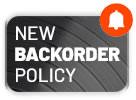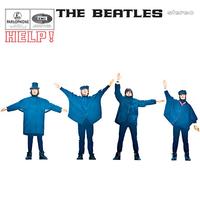The Beatles - Help!
| Label: |
EMI |
| Genre: |
Pop/Rock |
| Product No.: |
AEMI 82415
|
| UPC: | 094638241515 |
| Availability: |
In Stock
|
| Category: |
180 Gram Vinyl Record |
Cut at Abbey Road Studios using non-limited 24-bit digital masters sourced from the original analog master tapes!
Pressed on 180-gram vinyl; the album's North American LP debut in stereo
Optimum audiophile-quality sound from a first-rate team of producers and engineers
Rolling Stone 500 Greatest Albums of All Time - rated 331/500!
For years the most anticipated vinyl reissues have been from the one, the only Beatles catalog. Finally, after a delay due to the meticulousness of the remastering process and assorted other hurdles, that day has come. The Beatles catalog is getting the audiophile treatment! 180-gram vinyl pressings cut at Abbey Road Studios using the non-limited 24-bit digital masters sourced from the original master tapes!
Help! was the soundtrack to the Beatles' second feature film. But more than that, the 1965 soundtrack helped carve out new musical directions for the band and served up dramatic strides in production technology. Help! explored a tumultuous emotional bill of fare: Estrangement, sexual longing, uncertainty, infatuation and innocence. The group pounced on armada of available instruments — acoustic guitars, bongos, electric pianos, flutes and even strings — to deliver one of the greatest pop albums ever. And now it sounds bloody brilliant!
For its Beatles' Stereo Albums series on LP, Capitol/Apple turned to a crack team of engineers to remaster Help! from the original sources. The team, including Guy Massey, Steve Rooke and Sam Okell with Paul Hicks and Sean Magee undertook a four-year restoration process for the LP versions, combining state-of-the-art equipment, vintage studio gear and rigorous testing to meet the highest fidelity standards and produce authentic unsurpassed sound rivaling the original LPs. There is no longer any need to pay hundreds of dollars for Japanese pressings!
Yes, that means the timeless poignancy of "Yesterday" comes across with truly unimaginable heartbreaking sincerity. It means that the volume pedal George Harrison uses for the first time on "I Need You" and "Yes It Is" is fully discernible. It means that you can hear the woody cavity of he back of the acoustic Gibson guitar Ringo beats to add percussion to "I Need You." And yes, the fuzz-pedal bass track Paul McCartney added to the original on "Think for Yourself" — his first overdub on record — is preeminent. As is the soulfulness of the falsetto voices.
The advances in sonics were largely made possible by new Studer J-37 four-track recorders. Not only does this new LP pressing present these enhancements like never before, it adds to our enjoyment and insight of the music, allowing listeners to, in a sense, get as close to what went down as possible. So, at the 1:10 mark of "I Need You," the moment when Lennon hits the rim of the snare drum comes alive, the happy accident possessing the same amount of body, richness, detail, and depth as the rest of the landmark music on this set. Capitol has outdone itself.
Help! and Rubber Soul were mastered using digital remixed versions that George Martin, the group’s producer, oversaw in 1986. Extensive testing was done before engineers copied the analog master tapes into digital files using 24-bit/192 kHz resolution and a Prism A-D converter. Dust build-ups were removed from tape machine heads after the completion of each title. Artifacts such as electrical clicks, microphone vocal pops, excessive sibilance and poor edits were improved upon as long as they were judged not to damage the integrity of the songs. The 24/192 transfers were done to produce an archival copy of the tapes and then those files were reduced to 24/44.1 kHz files for final mastering. De-noising technology was applied in only a few necessary spots and on a sum total of less than five of the entire 525 minutes of Beatles music.
The digital files were cut to lacquers at Abbey Road Studios. Engineer Sean Magee cut the LPs in chronological release order. He used the original 24-bit remasters rather than the 16-bit versions that were required for CD production. It was decided to use the remasters that had not undergone "limiting," a procedure to increase the sound level.
Steps to eliminate vocal distortions and inner-groove distortions were addressed using a digital workstation. The latter can affect high-middle frequencies, producing a "mushy" sound noticeable on vocals. Using what Magee has described as "surgical EQ," problem frequencies were identified and reduced in level to compensate for this.
Lastly, the first batches of test pressings made from the master lacquers that had been sent to two pressing plants were judged. Records with any noise or click appearing on more than one test pressing in the same place were rejected, on the grounds that undesired sound had been introduced either during the cutting or pressing stage.
For producer Rick Rubin, The Beatles' recorded achievements are akin to a miracle. The most popular bands in the world today typically produce an album every four years, Rubin told a 2009 radio audience. That's two albums as an eight-year cycle. "And think of the growth or change between those two albums. The idea that The Beatles made thirteen albums in seven years and went through that arc of change ... it can't be done. Truthfully, I think of it as proof of God, because it's beyond man's ability."
| Side 1 | Help! | The Night Before | You've Got To Hide Your Love Away | I Need You | Another Girl | You're Going To Lose That Girl | Ticket To Ride | Side 2 |
Act Naturally | It's Only Love | You Like Me Too Much | Tell Me What You See | I've Just Seen A Face | Yesterday | Dizzy Miss Lizzy |
|
View other items by The Beatles |
|
 In-Stock Music Orders Over $99 SHIP FREE Within The Continental U.S.
In-Stock Music Orders Over $99 SHIP FREE Within The Continental U.S.







 Login
Login
 My Account
My Account
 Cart
Cart Wishlist
Wishlist
 Contact
Contact





